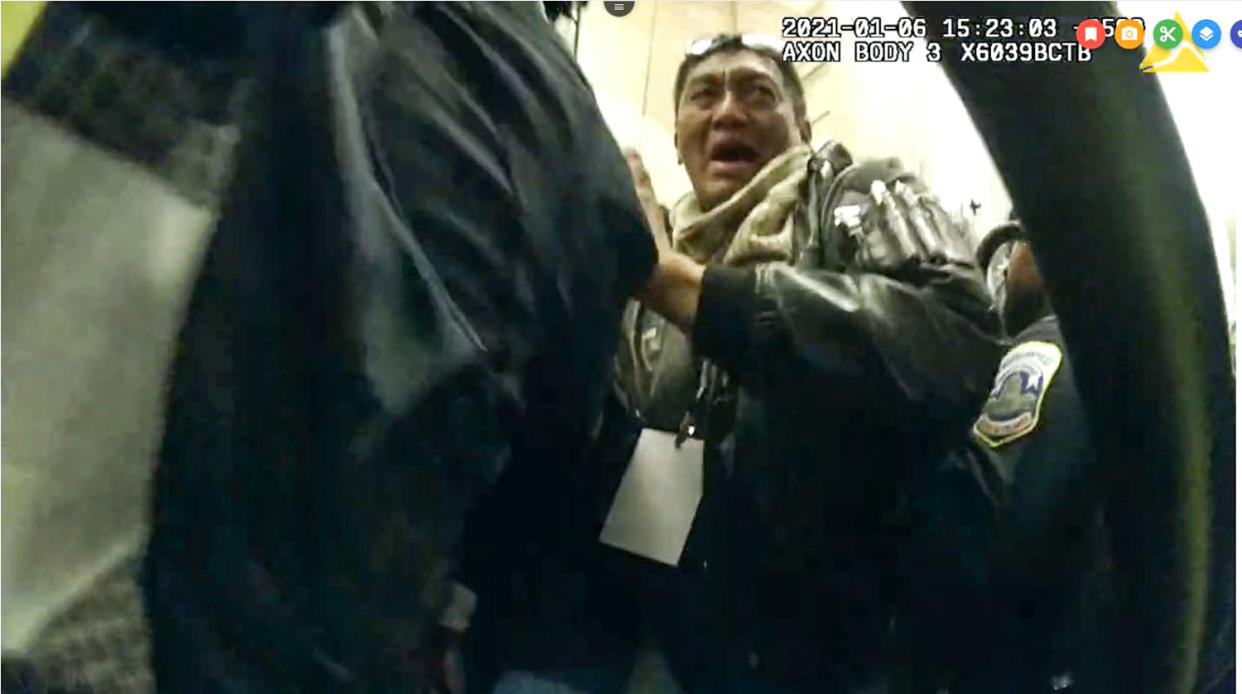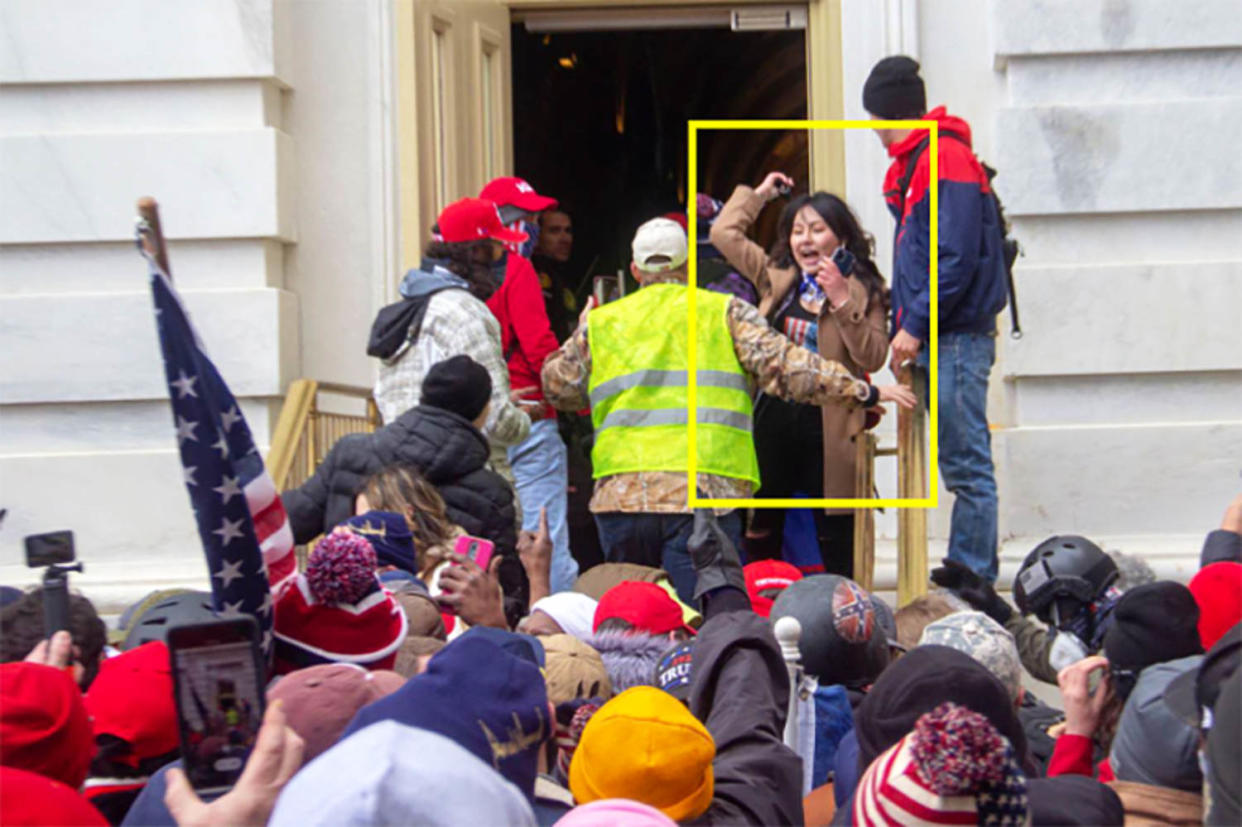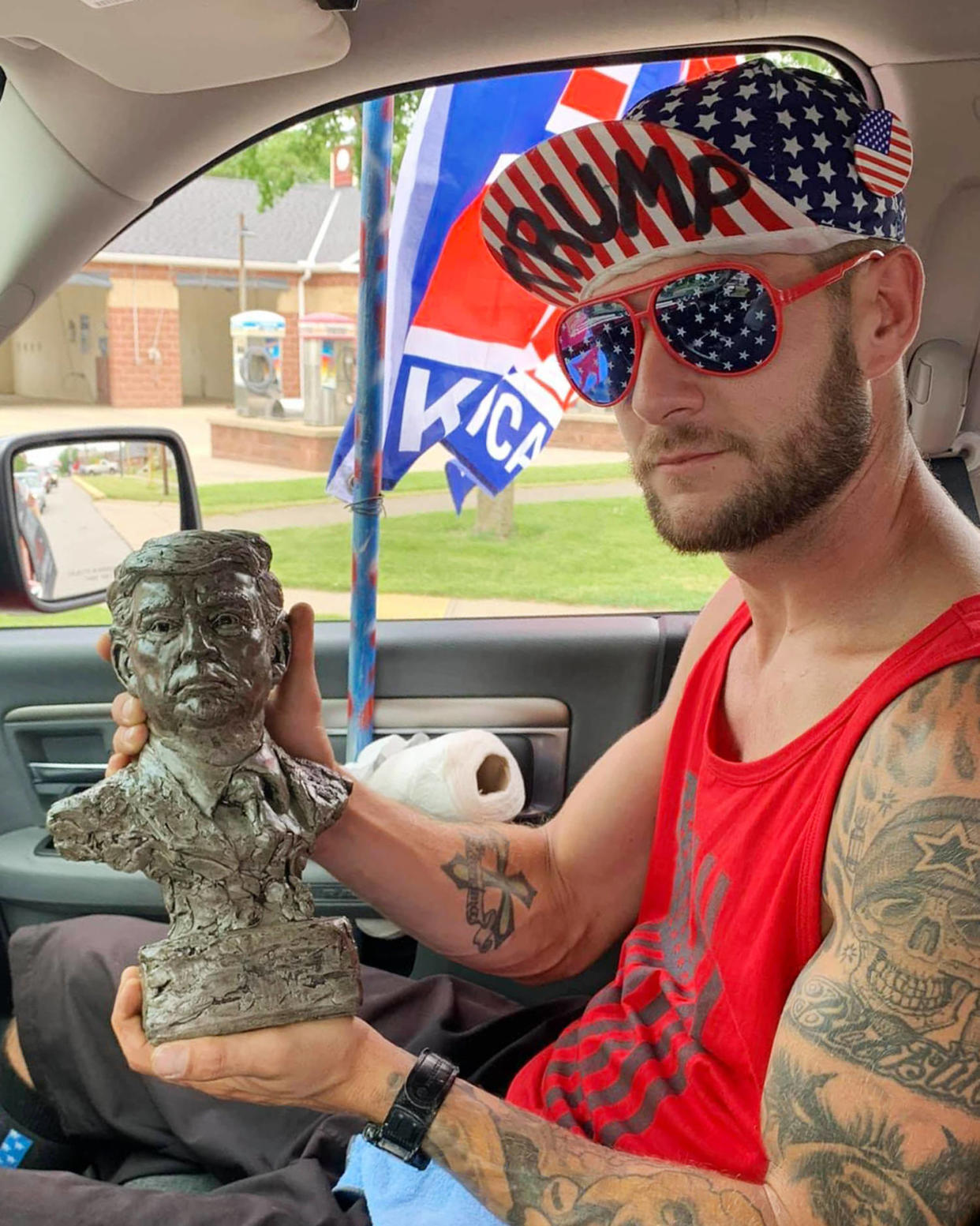Trump has delayed his Jan. 6 criminal trial. Hundreds of his supporters haven't been so lucky.
WASHINGTON — Donald Trump may never face a federal trial in connection with the attack on the U.S. Capitol, but hundreds of his supporters have already seen life-altering consequences of their actions in support of his election lies Jan. 6.
The former president has done everything he can to delay his criminal trial in Washington, D.C., with his lawyers arguing that he’s immune from prosecution and that it would amount to election interference to make him leave the 2024 campaign trail to mount his own defense.
But the 950 others who have been convicted of crimes related to Jan. 6 in the three years since the attack on the U.S. Capitol haven’t been able to make those arguments to delay their cases. About 500 defendants have been sentenced to periods of incarceration from just a few days behind bars to 22 years in federal prison. Hundreds of more cases continue to make their way through proceedings at the E. Barrett Prettyman Federal Courthouse not far from the Capitol, and online “sedition hunters” have identified hundreds of additional rioters to the FBI who haven’t been arrested. The statute of limitations expires in about 21 months, in January 2026.
Trump was originally set to be on trial before U.S. District Judge Tanya Chutkan right now, in March, on four federal charges related to the Jan. 6 attack. But his delay strategy has paid off, and the case has been on pause since December. The Supreme Court’s decision last month to hear oral arguments in April on Trump’s presidential immunity claims has left the future of his federal election interference trial in doubt.
While Trump may go to trial on unrelated charges in New York next month, it’s not clear that his three other criminal cases — including two related to his efforts to overturn his 2020 election loss — will get to trial before the election. If Trump is re-elected president, he’ll almost certainly either try to fire special counsel Jack Smith or appoint Justice Department officials who would.
There’d be precedent for dropping the case, or at the very least pausing the prosecution: The long-standing view of the Justice Department’s Office of Legal Counsel has been that a current president can’t be charged. It said in a 2000 opinion that “criminal prosecution of a sitting President would unconstitutionally undermine the capacity of the executive branch to perform its constitutionally assigned functions.”
Many Jan. 6 defendants in Washington, meanwhile, continue to point out the stark contrast between how Capitol attack cases have upended their lives and how the charges against Trump have played out. At sentencing hearings and in criminal trials, attorneys for Jan. 6 defendants have highlighted the lack of criminal penalties for high-profile purveyors of 2020 election lies, including Trump and his allies, even as their clients deal with the trickle-down consequences.
Trump’s words and election lies in the lead-up to the Capitol attack continue to echo through the federal courthouse in Washington. Last week, at the trial of Antonio LaMotta, Washington, D.C., Police Officer Christopher Owens testified that law enforcement had Trump supporters screaming in their faces that day. Some claimed they loved officers, he said, and others called them traitors, all while police were under assault with bear spray and 2x4s. He described the haunting chants of “U-S-A” and “stop the steal” — that was “a big one,” he said — and people chanting about hanging then-Vice President Mike Pence.

There were “360 degrees of rioters trying to assault you every which way,” Owens said.
LaMotta, who has pleaded not guilty to five charges, including a felony count of civil disorder, was previously convicted on gun charges for showing up armed outside a vote counting location in Philadelphia in a Hummer full of ammunition, which bore a QAnon sticker, after Trump singled out the city with baseless suggestions of voter fraud and corruption. U.S. District Judge Jia Cobb is expected to deliver a verdict in LaMotta’s Jan. 6 case at a hearing at 2:30 p.m. Thursday.
In the past few weeks, several Jan. 6 defendants have invoked Trump in trying to explain their behavior that day.
An attorney for a Vietnamese immigrant who "fled" to the U.S. when she was 19 said her “unsophisticated” client thought she needed to come to Washington to prevent a communist takeover of the country in part because of her “limited understanding of the English language.”
“I went to Washington in response to Trump’s call on social media,” wrote the defendant, Nhi Ngoc Mai Le. “I’m no longer afraid. Now I have different goals to focus on. I want to prioritize family and career, rather than following politics. I know that Biden is the lawful president of the United States. I feel shame and remorse. It’s embarrassing. I love this country deeply.”

Chutkan sentenced Mai Le to 10 days of imprisonment, along with a $1,000 fine. She allowed Mai Le to delay her sentence because she just had a baby.
An attorney for Colton McAbee, a former law enforcement officer who was sentenced to nearly six years in federal prison for assaulting police on Jan. 6, argued that McAbee “followed the president’s demands” to go to the Capitol.
“The sitting president assembled the mob, directed it to the Capitol, and told them to ‘fight like hell,’” McAbee’s lawyer wrote. “One cannot consider the seriousness of the actions of the mob on January 6 without considering that each of those people was there because several of our nation’s leaders told them to be there.”
An attorney for Jessica Reyher, a “mild-mannered, devoted mother of four” who was charged alongside her husband, said that she didn’t even vote for Trump (she voted third-party) but that “she and her husband had believed the lies the President and other political leaders had been spreading that the 2020 election was unfair due to fraud.” They ended up inside the lower west tunnel, where some of the worst violence took place.
“When powerful leaders, including the president himself, and so-called news outlets are spreading the fiction, Jessica, a high school graduate and mother of four, can hardly be blamed for believing the lies,” Reyher’s attorney wrote before Judge Reggie B. Walton sentenced her to 90 days of incarceration.
Arrests continue
New arrests continue to roll in. This month, Lance Ligocki was arrested in Illinois, with federal authorities alleging he swung at officers with a Trump flag while holding a “stop the steal” sign in his other hand. Last week, conservative influencer Isabella DeLuca was arrested, with the FBI saying she helped steal a table through a broken window that was then used to assault officers.

Several other Jan. 6 defendants appeared for court hearings last week, half a dozen of whom admitted their guilt as part of plea agreements with the government.
Benjamin Heffelfinger admitted he traveled to Washington from Ohio with his father and scaled a wall on the west side of the Capitol before he entered the building.
Dylan Bowling and Marissa Bowling, a couple from Alabama, admitted they went past blaring alarms and broken glass when they entered the Capitol, then lied to law enforcement when they were questioned about their participation in the Capitol attack.
Clive Kincaid admitted advancing on officers even after having been hit with six rubber bullets, eventually spending 25 minutes inside the building. (Kincaid, according to his statement of offense, “tried to calm other rioters” but admitted that he knew he didn’t have permission to remain on Capitol grounds and enter the building.)
Tony Gill admitted climbing into the Capitol through a broken window near the same lower west tunnel the Reyhers ended up in.
Spencer Offman, who was arrested in Washington state in December, pleaded guilty to entering a restricted building or grounds, admitting that he entered the Capitol through a broken window. Charging documents showed that the FBI originally investigated Offman in 2021, but he denied having gone any farther than the parking lot of the Capitol, and the investigation was closed. But a tipster contacted the FBI with photos showing Offman handling a barricade, and the government reopened the investigation.
Adam Kovsky, who was arrested in Michigan in December, appeared virtually before a courtroom with only a sole reporter in the gallery, admitting that he took pieces of wood from broken furniture inside the Capitol.
The same day Trump appeared in court
Trump reached an agreement with the special counsel’s office to appear in court in his Jan. 6 case in August rather than be arrested at his home or place of business. Just hours before he made that initial appearance, where he entered a not guilty plea, the FBI arrested riot suspect Mario Mares in Texas.
Unlike Trump, Mares was held in pretrial custody for months, after a federal magistrate judge in Texas ordered him detained. Prosecutors cited Mares’ alarming social media messages — “WE ARE GOING TO FIND YOU AND WE THE PEOPLE WITH NO MERCY ARE GOING TO HANG OR EXECUTE YOU !!!” — as well as the underlying allegation that formed the basis of the charges against him: that the bulge on his right hip at the Capitol on Jan. 6 was a black semi-automatic handgun.
Trump has repeatedly claimed — falsely — that his supporters were unarmed. Several defendants have been convicted of carrying guns at the Capitol, on top of the dozens upon dozens of rioters who used other objects to assault officers. One Trump supporter — now one of the fraction of Jan. 6 defendants being held before trial — was recently charged with firing two gunshots from the scaffolding of the inauguration platform.
Mares was eventually ordered released with conditions, but that took months to sort out.
“While the Court is troubled by Defendant’s social media posts and the serious allegation that he brought a handgun to the Capitol, those nonviolent actions do not persuade the Court that he poses such a danger that no combination of release conditions could assure public safety,” U.S. District Judge Ana Reyes ordered in November.
The order came after supporters of Mares wrote that he was a devout Christian.
“I don’t know how Jesus would feel about threatening to kill and execute people, but, you know, to each his own, I guess,” Reyes said at a detention hearing, noting that some of Mares’ violent posts came on Christmas Eve 2020.
His trial is now set for Sept. 16. For Mares, at least, a verdict is likely before Election Day.
